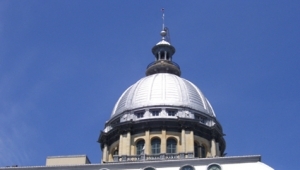
By Illinois Radio Network
SPRINGFIELD – Some state and federal lawmakers have questioned Illinois Senate Democrats’ request for a $41 billion bailout from the federal government for state and local governments amid the COVID-19 pandemic.
Federal lawmakers have approved and implemented several relief packages. One package included nearly $5 billion for Illinois to deal with the public health crisis.
State Senate President Don Harmon, D-Oak Park, sent a letter to members of Congress seeking a $41 billion bailout, including billions for state and local pensions.
A spokesman for Harmon said the federal relief offered so far has only been focused on direct COVID-19 costs and has not addressed the negative effects on state and local economies.
Harmon’s request seeks $15 billion for the state, $10 billion for state pensions, $6 billion for unemployment, $1 billion for public health spending and $9.6 billion for municipalities.
U.S. Rep. Rodney Davis, R-Taylorville, said Illinois’ financial problems were around before the COVID-19 outbreak.
“This is an issue where they’ve got to step up and make some tough decisions at the state level,” Davis said. “They’ve put Illinois as a whole in a much worse position to deal with a crisis like this than other states around us.”
Gov. J.B. Pritzker said he wasn’t aware of the letter when asked on Saturday. He said it was different from what he had been requesting from federal partners.
“I really believe that the states need to have some unencumbered dollars that come in that will help us with the coming year’s budget,” Pritzker said. “Every state has this problem. It just does.”
The COVID-19 outbreak and the governor’s stay-at-home order have shutdown large sectors of the state’s economy. Government officials have estimated state revenue could fall by more than $7 billion.
Last week, U.S. Sen. Dick Durbin, D-Springfield, joined with his Democratic colleagues in the Senate asking Senate Majority Leader Mitch McConnell for “flexible state and local government emergency funding.”
“On behalf of our state, local, and tribal governments, it is essential that you include robust, dedicated, and flexible funding to all units of state and local government in the next interim emergency coronavirus package to support their ongoing efforts in the fight against this pandemic,” the letter said.
State Rep. Tim Butler, R-Springfield, agreed with some Republican members of Illinois’ congressional delegation who said the bailout should go directly to local governments instead of being filtered through state government. But he said state budgeteers shouldn’t count on federal tax dollars.
“I think we’re going to have to manage this largely on our own,” Butler said. “Is there going to be more federal dollars coming down the pike? Sure. Are they going to go to municipalities and things like that? Probably so. But … if every state asks for $40 billion, the feds aren’t going to be able to do it.”
U.S. Rep. Darin LaHood, R-Peoria, said while more relief packages are on the way for small businesses and hospitals, a $41 billion request from Illinois Senate Democrats was a long shot.
A letter Illinois’ Republican Congressional delegation sent Harmon said they will fight for more federal resources for Illinois, but said reforms were needed.
The GOP suggested:
-
Pension reform “to reduce long-term liabilities and make the system more equitable to the people of Illinois before federal money is used to support the pension system”
-
Reduced state and local spending to make “government more flexible and responsive to the people”
-
Reduce unfunded mandates on local governments “in order to provide the same flexibility the State is seeking for the use of federal dollars”
-
Remove the graduated income tax constitutional amendment from the November ballot “to protect Illinois jobs that are already at risk from the pandemic and to stem the exodus of people and opportunity from our great State.”
Illinois Radio Network can be reached at [email protected].






